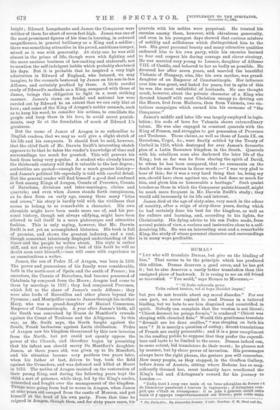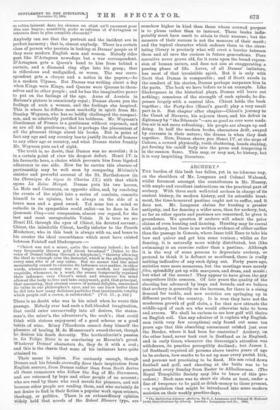DUMA S.
"LET who will translate Dumas, but give us the binding of him." That seems to be the principle which has produced this edition. Dumas deserves a good cover, and he has got it ; but he also deserves a vastly better translation than this unsigned piece of hackwork. It is vexing to see an old friend so travestied. "You scold," says Horace to Mascenas,— " Si forte subucula pens Trita subest tunics's, yel el toga dissidet impar,' but you do not trouble about my moral disorder." For our own part, we never repined to read Dumas in a tattered binding, but we hate to see him disguised and countrified in spirit. Nobody can complain that the version is not literal; " Claicot dormait les poings ferm6s," is rendered " Ohieeb was sleeping with clenched fists." Would this gentleman translate " dormait sur lea deux oreilles," "was sleeping on both his ears " P It is merely a question of outlay ; decent translations of French are easily procurable ; and it is a poor compliment to the reading public to suppose that they prefer the expendi- ture and taste to be limited to the cover. Dumas indeed can, to some extent, bid translators do their worst ; he pleases not by manner, but by sheer power of invention. His personages always have the right phrase, the gesture you will remember. How many people, as they stopped, in the Grafton Gallery, before Anne of Austria, sitting where Rubens has so mag- nificently throned her, must instantly have recollected the King's ball and d'Artagnan's reward for his journey to London :— " Enfin tout h. coup une main et un bras adorables de forme e t de blszcheur passerent h travers in tapisserie ; d'Artagt: mainc om - prit clue c'etait sa recompense h il se jeta genous, smut cette main et y appuya respectueusement sea levres ; pule co * The Porty-five, By Aloxandre Dumas. 2 vols. London; J. M. Dent and Co.
se retira laissant dans los siennes un objet qu'il roconnut pour etre une bague; aussit6tla porte Be referma et d'Ar tagnan se retrouva dans is plus complbte obscurit6."
Anybody can see that the portrait and the incident are in perfect harmony ; that is, almost anybody. There is a certain class of person who persists in looking at Dumas' people as if they were modern English men and women. Nobody rides post like D'Artaguan nowadays but a war correspondent. D'Artagnan gets a Queen's hand to kiss from behind a curtain, and a diamond ring slips into his grasp ; that is ridiculous and undignified, or worse. The war corre- spondent gets a cheque and a notice in the papers,—he is a modern Ulysses. But Dumas was writing about a day when Kings were Kings, and Queens were Queens to them- selves and to other people ; and he has the imaginative power
to put on the feelings of the age. Anne of Austria in Rubella's picture is consciously royal ; Dumas shows you the feelings of such a woman, and the feelings she inspired. This is where he differs most markedly in spirit from Mr. Stanley Weyinan, who has so boldly challenged the compari- son, and so admirably justified his boldness. Mr. Weyman's Gentleman of France is a gentleman without reproach, and so are all his gentlemen ; that is perhaps the pleasantest of all the pleasant things about his books. But in point of fact any age and any country has to justify its code of honour to any other age or country, and what Dumas states frankly Mr. Wey man puts out of sight.
The truth is, no doubt, that Dumas was no moralist; it is
in a certain point of view his deepest defect. Henri 1V. is his favourite hero, a choice which prevents him from bigoted adherence to one side. How far he carries this absence of partisanship may be well seen by comparing Morinule's sinister and powerful account of the St. Bartholomew (in the Chronique du regne de Charles IX.) with that which opens La Reine Margot. Dumas puts his two heroes, La Mole and Coconnas, on opposite sides, and, by resolving the events of the night into a series of combats, commits himself to no opinion, but is always on the side of a brave man and a good sword. Yet none but a mind so catholic in its sympathies could enlist—as he does in Les Quarante Cing—our compassion, almost our regard, for the last and most unregrettable Valois. It is true we see Henri III, through the eyes of Chicot, his devoted servant ; Chicot, the inimitable Chicot, hardly inferior to the Fourth Musketeer, who in this book is always with us, and bears to his creator the ideal resemblance which must have existed between Falstaff and Shakespeare :—
" Chicot was not a miser, quite the contrary indeed ; he had very frequently thrown gold, about broadcast" [listen to the voice of Dumas talking through a telephone], "thereby allowing the ideal to triumph over the material, which is the philosophy of every man who is of any value. But no sooner had the mind momentarily ceased to exorcise its influence over matter, in other words, whenever money was no longer needed, nor sacrifice requisite, whenever, in a word, the senses temporarily regained their influence over Chicot's mind, and whenever his mind allowed the body to live and take enjoyment, gold, that principal. that unceasing, that eternal source of animal delights, reassumed its value in our philosopher's eyes, and no one knew bettor than he did into how many delicious particles that inestimable totality which people call a crown, is subdivided." (Vol. II., p. 242.)
There is no doubt who was in his mind when he wrote this passage. Nobody ever had such a full-blooded imagination, that could enter unreservedly into all desires, the states- man's, the miser's, the adventurer's, the cook's ; that could think with riotous enjoyment of a good scheme or a good bottle of wine. Rimy l'Haudouin cannot deny himself the pleasure of healing M. de Monsorean's sword-thrust, though he desires his death devoutly. The horticulturist's passion in La Tulip° Noire is as convincing as Mazarin's greed. Whatever Mime' characters do, they do it with a zest ; and this is the charm that none of his imitators have quite attained to.
Their name is legion. For curiously enough, though Dumas and hie friends avowedly drew their inspiration from English sources, from Dumas rather than. from Scott derive
all those romancers who follow the flag of Mr. Stevenson, and are esteemed by boys and other people of no account; who are read by those who read novels for pleasure, and not because other people are reading them, and who certainly do not desire to find in their fiction a popular work upon science, theology, or politics. There is an extraordinary opinion widely held that novels of the Robert Elsmere type, are somehow higher in kind than those whose avowed purpose is to please rather than to instruct. These books Wis. putably must have merit to attain to their success ; but the measure of their success is not the measure of their merit ; and the topical character which endears them to the circu- lating library is precisely what will erect a barrier between them and all save the curious in future generations. Pure narrative never grows old, for it rests upon the broad expres- sion of human nature, and does not aim at exaggerating a passing phase of life. Lever, cf all Dumas' imitators, has most of that irresistible spirit. But it is only with Scott that Dumas is comparable ; and if Scott excels in the conduct of his stories, Dumas perhaps surpasses him in the parts. The book we have before us is an example. Like Shakespeare in the historical plays, Dumas will leave out nothing; conscious of the strength of each episode, he dis- penses largely with a central idea. Chicot holds the book together ; the Forty-five (Henri's guard) play a very small part in it. But chapter after chapter—Ohicot's journey to the Court of Navarre, his sojourn there, and his defeat in diplomacy by "the B(Sarnois "—are as good as ever were made. Sea-air is not more refreshing; his people are always up and doing. In half the modern books, characters drift, swayed by currents in their nature ; the drama is when they dash together. Now, Dumas shows you Henri IV. at the siege of Cahors, a coward physically, teeth chattering, hands shaking, yet forcing his caitiff body into the press and tempering it in the cannon flame. This may, or may not, be history, but it is very inspiriting literature.



















































 Previous page
Previous page